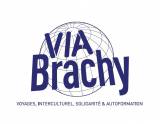User Tools
Sidebar
This is an old revision of the document!
Table of Contents

ABOUT US
VIA BRACHY
 Via Brachy is a French non-profit organization established at Toulouse, Occitanie.
Via Brachy is a French non-profit organization established at Toulouse, Occitanie.
Since 1998, we aim at empowering people, enhancing social and ecological projects run by citizens and fostering cultural dialogue and knowledge exchange between people and organizations from various backgrounds. We organize mobility projects and non-formal educational activities in order to encourage social inclusion and to help people find their way in society.
We believe that travelling opens people’s minds to new realities and encourages them to share ideas, knowledge and experiences. We promote eco-friendly living and social economy and advocate for social change.
In practice:
- we offer learning opportunities to people as catalysts for personal transformation and social change, either by organizing our own learning mobility projects (youth exchanges, seminars, training courses) in South-West France, nor by partnering with other social organization in Europe;
- we design intercultural trips to Senegal and support our partners’ initiatives in the village of Yayeme (development of eco-friendly income-generating activities, using ecological equipment as low-energy cooking tools and dryers);
- we organize local trainings and public events in order to share what we learnt and to address social and ecological issues with people from various background.
Discover our website !
OUR APPROACH
Since 2015, our training courses take place in a rural cottage near Gaillac (Tarn, France), which creates the proper atmosphere for a good learning experience and a deeper connection between the participants.
Each training course gathers around 30 people coming from 3 to 9 different EU countries.
For 7 to 10 days, they share methods and tools, learn from each other’s experience and benefit from the inputs of skilled facilitators, trainers, educators, social workers or activists. Together, they define the key concepts of the training course (power, leadership, cooperation, communication, supporting, etc.), point out the processes underlying the issues they are addressing, determine their impacts and acquire appropriate tools and methods to overcome the issues at stake and to improve their work and the quality of the service they provide to their target groups.
We value participants’ experience and knowledge, and work as much as possible on practical cases in order for them to get gradually familiar with the concepts, methods and tools they are introduced to.
We encourage them to take a step back from their own experience and put into perspective the knowledge acquired with regard to their work or needs. We invite them to take a critical look on the topics we address and to question the way we deal with them.
Whenever possible, we give the participants the opportunity to experience the methods first-hand, put their knowledge to the test and strengthen their ability to lead collaborative projects and their facilitation, communication or mediation skills. We assign them goals to achieve in order for them to practice the concepts, methods and tools on their own and to step up the intensity of the training course.
In addition to the working sessions scheduled during the day, we encourage the participants to take advantage of the time spent together to develop their skills in an intercultural context, share knowledge and deepen their relationship in a more intimate setting, and strengthen a set of soft and social skills that matter in collective work as well as in youth and social work.
We expect that our training courses inspire the participants and lead to an increasing motivation in what they do or intend to do, and hope they contribute to broadening their European network, this hopefully leading to future cooperation.
MAIN FACILITATORS
Most of the time, our training courses are led by a quatuor of facilitators.
Here are a few words on the people you might meet if you join us:
Cecilia Restrepo
Graduated in Sociology-Anthropology and Cultural Policies (Master), Cecilia joined Via Brachy’s team in 2013 for the implementation of the first EU project of the organization. Since then, she has coordinated the learning mobility projects it organizes, both in Europe and Senegal.
Caroline Ferrafiat
Graduated in Management of Social and International Solidarity Projects (Master), Caroline coordinates Via Brachy’s EU projects since 2013, after several experiences as project manager in NGOs in France and South-East Asia. Along with Cecilia Restrepo, she is the organization’s swiss-knife.
Jérôme de Daran
Graduated in Economics, Jérôme is the cofounder of La Volte, an atypical group of facilitators and social activists working in the fields of non formal education. Since 2012, he is supporting the development of social projects and organizations at both local, regional and EU scale.
François Hirschowitz
Former street educator in charge of accompanying vulnerable people and social manager in an organization fostering labor market inclusion, François is currently working as a trainer/facilitator in group dynamics, conflict management and authentic communication.
Hélène Cavaignac
Trainer and facilitator in the non-formal education field since 2013, she supports individuals (and especially adults without degrees and people with fewer opportunities) in their learning and socio-professional journey and trains or monitors social organizations so that they can develop their creative potential, adopt participative methods and better adapt their action to their target groups.



